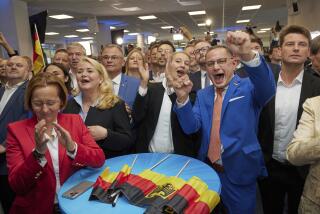EUROPE : Italians to Return to Familiar Haunt: the Ballot Box
- Share via
ROME — For the third time in four years, Italians will vote Sunday in search of a reformist government equipped to lead their country into the next century as a first-line partner in Europe.
For the third time, disappointment beckons.
This election fits into the tradition here of bread and circuses. Politicians nightly entertain on television. Insults fly, drowning dialogue and constructive discussion.
Thursday night, center-left supporters filled historic Piazza del Popolo here with aqua flags and cheers for extravagant promises: honest government, social justice, an end to the draft.
Tonight, it is the turn of the center-right: more jobs, lower taxes.
Italians have heard it all before.
“Many people fear that the underlying game is the same old one: Grab the handles of power, vroom, vroom, and never mind that the engine has no gas and that the car risks crashing into Brussels,” said James Walston, a specialist in Italian politics at the American University of Rome, referring to the seat of the European Union.
A splintered political universe of 292 parties has divided into two broad coalitions for Sunday’s vote; the only serious party running alone is maverick Umberto Bossi’s Northern League, which seeks to divide Italy into north and south.
Election rules forbid publication of polls in the last two weeks. But at last count, the two coalitions, each with its share of unlikely bedmates, were running neck and neck.
The coalitions are the result of a political earthquake that began as a judicial inquiry four years ago into massive institutional corruption. Scandal destroyed the centrist Christian Democrats’ half-century domination of power, then the party itself and its allies.
In context, Sunday’s vote is one more attempt by left and right to woo centrist voters and produce a credible successor.
The center-right coalition is the Freedom Alliance, led by media magnate and former Prime Minister Silvio Berlusconi of his Forza Italia movement and Gianfranco Fini, a self-described “man of the right” who heads what he has called the “post-fascist” National Alliance.
Berlusconi, who ruled for seven months after the 1994 election, is the would-be prime minister. But his relations with Fini, who has pulled the alliance to the right, are sometimes frosty.
On the center-left is the Olive Tree alliance, whose prime ministerial candidate is Romano Prodi, a bicycle-loving economics professor from Bologna who embodies the moderate Roman Catholic vote that served Christian Democrats so well for so long.
The Olive’s trunk, though, is the Party of the Democratic Left, the former Italian Communist Party, which is now a respectable social democratic member of the European left under Massimo D’Alema. It is joined for the vote by greens, old-line Communists, remnants of the Christian Democratic left and current caretaker Prime Minister Lamberto Dini, a former central banker.
An unprecedented degree of campaign mudslinging masks the reality that issues have replaced ideology as the election fulcrum. If the electoral alliances are improbable, consider too that there’s little difference between programs of the left and right. Both say they will create jobs, improve public services, sell off state enterprises and reduce government spending.
The real key to the election is whether the government it generates can enact two long-term reforms on which Italy’s future within Europe seems to hinge.
One is restructuring the government’s deficit, and the national debt, to enable Italy to be part of Europe’s economic and monetary union in 1999. The other is constitutional reform to change the way Italy elects its leaders and to readjust the balance of power between the legislature and the executive branch.
Under electoral reform, Italy would probably choose a president by direct vote for the first time and elect its parliament without any of the proportional representation that has in the past ensured a system of strong, corrupt political parties and weak governments.
In a high-stakes game for the Italian future, the reforms have been long-sought by major parties in principle but oft-sacrificed to partisan advantage.
“If Italy cannot tackle its constitutional and financial difficulties, it will be progressively marginalized in the European Union and sooner or later forced out of this club of the leading industrialized nations,” historian Sergio Romano said.
Many analysts fear that Sunday’s vote will not produce a decisive victory, or generate sufficient post-electoral cohesion within the winning coalition, to allow the reforms.
More to Read
Sign up for Essential California
The most important California stories and recommendations in your inbox every morning.
You may occasionally receive promotional content from the Los Angeles Times.













